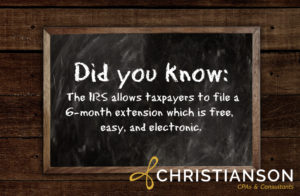 The new tax law passed this year is more complicated than it has been in decades. Many people who have traditionally done taxes on their own are opting to switch to a Certified Public Accountant to ensure they comply with the law and minimize their tax liability. As the tax law becomes more complex, there are situations when you will need to file for an extension of time to file your income tax returns.
The new tax law passed this year is more complicated than it has been in decades. Many people who have traditionally done taxes on their own are opting to switch to a Certified Public Accountant to ensure they comply with the law and minimize their tax liability. As the tax law becomes more complex, there are situations when you will need to file for an extension of time to file your income tax returns.
DID YOU KNOW: The IRS allows taxpayers to file a 6-month extension which is free, easy, and electronic and this can be done for any reason if you need more time to prepare your taxes. An extension form needs to be filed by April 15th for individuals and corporations and March 15th for partnerships and S corporations. An extension moves the filing deadline for individual and corporate tax returns from April 15th to Oct. 15th and for partnerships and S corporations from March 15th to Sept. 15th. An extension is required to be filed to avoid being assessed a late filing fee.
Please note that for individual filers, contributions to a traditional IRA and Roth IRAs are still due by the original April 15th deadline. Also note that while an extension will give you extra time to file your return, any tax you owe is still due by the original April 15th deadline. This means the extension is a delay in the time to file, not a delay in the time to pay an outstanding tax bill. If your tax is paid after April 15th, you will be assessed penalties and interest.
According to the American Institute of CPAs (AICPA), filing an extension may sound risky or you may worry you’ll owe more money or be more likely to be audited, but that’s not the case. A tax extension makes it easier for you to compile and review all the necessary tax documentation needed for an accurate return. It may be more cost effective to file an extension now than an amended return later.
How Do I Request an Extension?
There are four ways to request an automatic extension of time to file a U.S. individual income tax return.
- Contact your CPA!
- You can pay all or part of your estimated income tax due and indicate that the payment is for an extension using Direct Pay, the Electronic Federal Tax Payment System, or using a credit or debit card.
- You can file Form 8868 for Exempt Organizations, Form 7004 for Businesses and Corporations, Form 4868 for Individuals electronically by accessing IRS e-file using your home computer or by using a tax professional who uses e-file.
- You can file a paper forms and enclose payment of your estimate of tax due (optional).
If you have tax questions or need help filing an extension, contact one of our experts today!
[button_1 text=”Contact%20Christianson%20Today!” text_size=”15″ text_color=”#ffffff” text_font=”Lato;google” text_letter_spacing=”1″ subtext_panel=”N” text_shadow_panel=”N” styling_width=”30″ styling_height=”20″ styling_border_color=”#ffffff” styling_border_size=”5″ styling_border_radius=”23″ styling_border_opacity=”100″ styling_gradient_start_color=”#1b335d” styling_gradient_end_color=”#1b335d” drop_shadow_panel=”N” inset_shadow_panel=”N” align=”center” href=”https://www.christiansoncpa.com/contact-us/”/]



